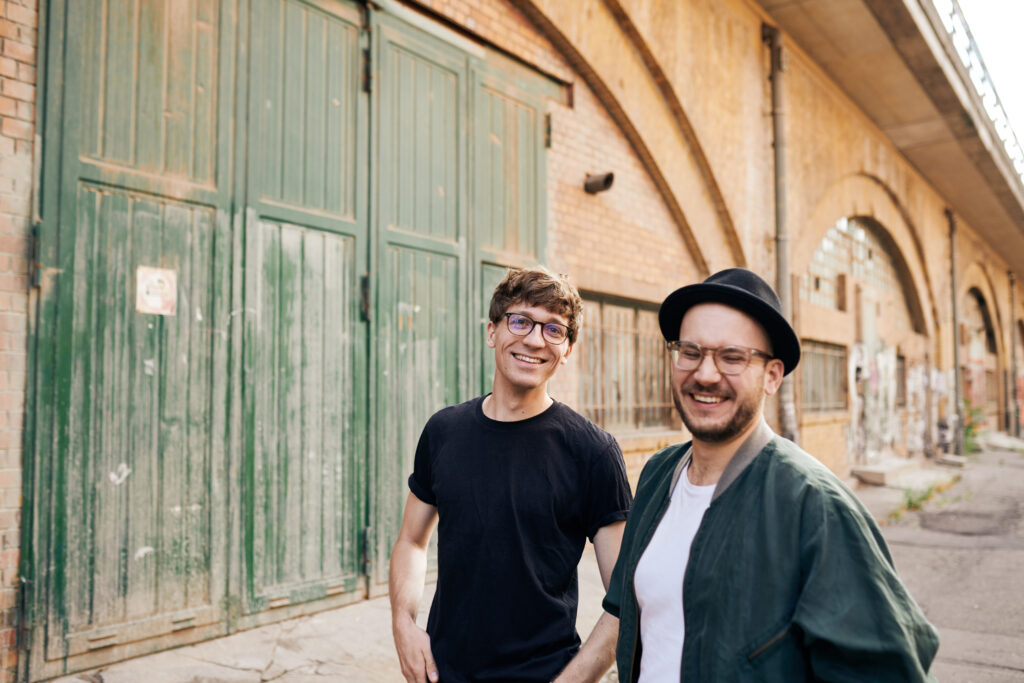An interview with German journalists Niklas Münch and Tobias Hausdorf
In their podcast Hinter den Zeilen, Tobias and Niklas point to the diverse forms of injustice and discrimination in media labour. In late December 2021, they released a podcast about fixers, their role, and their position in the international journalistic ecosystem, for which they communicated with local producers/fixers from all over the world. We talked not only about this episode but also about the notion of “radical journalism,” young journalists’ precarity, and the need for self-reflexivity and transparency in journalism.

You did pretty extensive research for the episode. How did the fixers that you talked to depict their situation? What are your highlights from their stories?
Niklas: Maybe we can start with a funny one. There is this website called Worldfixer.com. Pavlos, a guy we talked to for the episode, introduced himself as “the best-rated fixer in Greece on Worldfixer.com.” It was the first sentence he wrote to me. I did not know the website before, and it puzzled us because only journalists or clients can rate fixers, but apparently, it does not work the other way around.
Tobias: It was so telling, and it also points to the power dynamic of international journalism.
Niklas: Yes, it struck me why the fixers could not also rate journalists who did not pay or were misbehaving? It would make so much sense. Another interesting thing that I learned was that foreign reporting is a whole ecosystem within journalism with foreign correspondents and fixers and everything. And if you are not a part of this group, it is hard to get into it.
Tobias: I found it interesting that Carolina [another fixer and podcast contributor] would love to be a foreign correspondent or an international journalist, but it is very hard, coming from Ecuador. There is an international divide; it is not easy for her to gain an international audience, although she has worked for international media. She saw and experienced this colonial structure that continues through the media system. For Western journalists, it is much easier to go anywhere with their passport – and it is not just about the passport.
She also told us a story of showing around a female journalist who was culturally insensitive and pushy. The journalist would have her recorder on without asking, and the fixer was like, come on, talk first, have a tea, whatever. That was important to the fixer, because she is the one who is staying in the country and has to apologize for the rudeness of her client.
At the same time, in a few days, the fixer earns as much as others earn in a month. But the pay is not everything. It would be nicer to get some recognition. Let’s be realistic – as Pavlos said – nobody is a magician or does everything independently. Just be transparent about it.
Niklas: The common topic is that the pay is good, especially when comparing it to what other people earn in the country. The fixers that we talked to had quite different opinions. But one thing that they shared was why it is that their role is so rarely mentioned.
“Radical” conflict journalism?
How did the idea to focus on fixers and make this podcast come to your mind?
Tobias: We knew that foreign reporting is not done just by one person and that there are locals involved. And then we got more involved in it when we read 12 theses on radical journalism, and one of these said that fixers need to be paid or recognized in the same way as journalists. And it was the second step, the second time that the word popped up again. So we thought – what is the fixer? Why is nobody talking about that?
Niklas: Then we thought it would be good to bring up the issue now because of Afghanistan. We are interested in power dynamics in journalism, discrimination, and diversity, so the topic of fixers was close.
What do you mean by “radical journalism”? And how it is related to fixers?
Tobias: It was not us who coined the term, but we talked about the notion of radical journalism in one of our past episodes. It is a piece of twelve claims on what journalism should be like, theses for better journalism. It says that journalists should reflect on their role and that as a journalist, you should think about your own identity and how you bring it into your work, your stories. It also speaks about diversity. German media are not as diverse as German society. And it says that payments should be fair – and all kinds of essential things. You have inequalities in the system. Fixers get really little, freelancers get little, and editors get a lot. The authors thus ask for equal pay for freelancers and employees, for a more accurate representation of communities, and so on. We felt that these principles should be common sense. They are not, and it shows that German journalistic work is not that fair. Maybe the products are nice – Der Spiegel, Die Zeit, lovely TV documentaries on whatever, but the system is not that good.
So the notion of radical journalism is actually not so radical, after all.
Tobias: No, this was our first question: what is radical about saying that there is enough money in the system but not equally distributed?
Niklas: Another topic of the twelve theses is journalists’ egos. The journalist looks like a genius who does everything himself and comes out with big stories. Radical journalism says that journalism is teamwork, and most of the time, journalists have helpers, fixers, and people who are needed to make these stories possible. No journalist is an island.
Tobias: One of the fixers said that the best working experience was with female freelance journalists. I was not surprised about that because most authors of the radical journalism notion were young female freelance journalists. Because they are also in a different position, they know what it is like, getting from one contract and assignment to another. Perhaps they are more sensitive to these topics.
Transparency, trust, and the reliance on invisible/unpaid labour
Did the problems of fixing in international journalism resonate with some other topics you have been dealing with in your podcast series?
Niklas: If we stay with the idea of radical journalism, one claim was also about transparency. I talked about fixing and fixers with my friends who are not in journalism, and they just do not know that these people exist and do this work. It would be important – and essential – to regularly make sure that readers understand what kind of work is involved in a journalistic piece, how many people are involved, and what their roles are. I think this is important for the trust in media, so that people understand how news is made. Most of the time, people get to read the final piece, and they have no idea what work the story involves.
Tobias: It is not like that you give away your magic trick. You can rebuild trust if you are transparent about how you work. And if you make mistakes but are transparent about that, people start trusting you again. You can provide it as a service, showing how journalism works, especially with text pieces. Just say the names, come on! Did Pavlos work on it? Just put his name there, give him credit, it will not hurt you.
Can you imagine building transparency into the very narrative structures? Is it feasible to always mention all the processes and people who contributed to the piece?
Tobias: Of course, it is feasible. It is just a question of intention. Do I intentionally mention where I get the information from, or do I leave it out?
Niklas: I can imagine that there might not be room for these claims in the article because it breaks the storytelling, but you can always add a little box or links. Whoever is interested can check it out. The problem is to implement it in everyday work. Nowadays it’s like this: You write an article, and that’s it. Nobody does the extra work when it is not required and built into daily work. But it should be.
If their work remains so often invisible, do fixers have anything in common with other media professionals at all?
Niklas: What is common is the power dynamics and dependencies. The dynamic between journalists and fixers is similar to the power dynamic between freelance journalists and editors who are employed. Or junior journalists and senior journalists with full-time contracts who gain a lot of money and privileges.
Tobias: Fixers are needed in journalism. International journalism is dependent on fixers. A lot of things wouldn’t work without them. And I think German journalism is kind of dependent on unpaid internships. There are too many German media who have a lot of interns but do not pay them or pay very little. And the system kind of runs like that. Nobody is waiting here for you to become a journalist. But fixers are at least needed.
Niklas: I hope that the media will think more about the working conditions of young journalists and find out how to get young talents into the profession. At the same time, as young journalists, we also struggled to become journalists through unpaid internships, but in twenty years, we will hopefully be decently paid. For fixers who strive to get a better position in journalism, it is nearly impossible to become foreign correspondents. There is this glass ceiling.

“We do not just want to do our job, but also think about it”
Why did you decide to take this critical look at journalism?
Tobias: We have the feeling that it is missing. It is just tweets, maybe a thread on Twitter. I have the feeling that self-reflexivity is a topic among our like-minded colleagues and guests of our podcast. But media itself is not very reflexive. Even in Der Spiegel, you do not have a real media section. And in newspapers that have such a section, it is just descriptive, limited to dry information, saying, for example, that Süddeutsche Zeitung is letting fifty people go. I want to know why they dismiss the people, and I want them to talk to the people who have to go.
We do not just want to do our job, but also think about it. And I believe that journalists should do this a lot.
Niklas: Media is very good at pointing to other industries and saying what is wrong and bad there. But we are bad at pointing to ourselves or other media outlets and saying that it does not work well.
Tobias: Because now too many journalists are leaving for PR. Just now, when the German government was formed, I saw many good people from Der Spiegel or Taz going. They are now spokespeople for ministers. High-position people who have good names in journalism.
Niklas: And it is a one-way journey.
